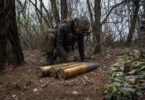F.P. Report
LONDON: Like my good friend and colleague Baroness Goldie, it is good to be here in Sarajevo today. This is not my first visit to Bosnia and Herzegovina, and it is unlikely to be my last.
As the good Baroness says the UK’s links with this country and its diverse and resilience people are deep, important and enduring; as they are with many of the countries in the Balkans.
We have seen good evidence of those links in the recent discussion of Bosnia in Parliament in the UK, and the forthcoming debate on the importance of the sovereignty and territorial integrity of Bosnia and Herzegovina in the House on 2 December.
My colleague the Foreign Secretary has spoken clearly and forcefully this week at gatherings of OSCE and NATO foreign ministers of the importance of joint action to protect the hard-won gains in Bosnia and Herzegovina of the last 26 years.
There should be no doubt that the UK and our allies remain committed to helping Bosnia and Herzegovina flourish as a democratic State free of malign influences – as we reaffirmed to President Komsic this morning.
Baroness Goldie has spoken about issues that are rightly close to her heart, in particular the issue of Women Peace and Security. I would like to speak on a topic that has been close to mine for several years.
In addition to my Ministerial role I am also the Prime Minister’s Special Representative on Preventing Sexual Violence in Conflict. It is a role that it is very important to me. Tackling sexual violence, ensuring perpetrators are held to account and supporting survivors is critical. And I am proud to lead the UK’s work on this.
For nearly a decade, the UK has demonstrated global leadership on preventing and responding to the scourge of sexual violence in conflict.
Globally, we have committed over £50 million to support survivors and children born of sexual violence since 2012, funding projects in 29 countries to prevent and respond to conflict-related sexual violence – including in countries here in the Balkans.
We have been active in Bosnia and Herzegovina for several years. Our work with TRIAL International has secured landmark legal rulings. And our work with religious leaders has helped tackle the stigma that follows this heinous crime.
We currently fund training to eliminate judicial stigma, and provide support to survivors through local networks of safe houses; and fund important projects to tackle sexual harassment in higher education.
We continue to prioritise this work here, and I have been able to visit two of our projects on this visit. I would like to take this opportunity to thank the Government, our implementers and global partners for continued collaboration that enables this important work to take place.
Conflict-related sexual violence is a brutal tactic of war, which leaves profound, lasting scars on survivors, children born as a result and their communities. As members of the military and civilian security experts I have little doubt that you agree with me that such tactics have no place in conflict, and that perpetrators must be brought to justice.
In my work on this issue, children born of such violence are at the forefront of my mind. Tens of thousands of children who, due to the circumstances of their conception, are marginalised and stigmatised by their communities, by bureaucracies and sometimes by their own families.
Two weeks ago in London I launched our Call to Action to Ensure the Rights and Wellbeing of Children Born of Sexual Violence in Conflict, where I shared a stage with a young Bosnian women born of rape during the conflict here. Her story and the stories of countless others underline our collective responsibility to act.
This Call to Action is a first step galvanising international action on behalf of this vulnerable group of children around the world.
It has been endorsed by the Offices of the UN’s Special Representatives of the Secretary-General on Sexual Violence in Conflict and Children and Armed Conflict, the United States, Norway, South Sudan, Mexico and Guatemala.
And I am delighted that in our meeting yesterday my colleague Foreign Minister Turkovic has agreed to join the UK in formally endorsing the Call to Action. We will work together to develop individual commitments and truly change the situation for these children
Like all good ideas our Call to Action is actually quite straightforward.
Around the world we need to:
- speak out on the challenges faced by children born of sexual violence in conflict and their role in building peaceful, prosperous societies
- provide space for children born of sexual violence and the survivors who bore them to share their knowledge safely and meaningfully in discussions and debates affecting them
- strengthen legal and policy frameworks to eliminate barriers and pro-actively support the rights and well-being of children born of sexual violence in conflict
- encourage child-sensitive approaches to sustainable development that recognise children born of sexual violence amongst the most vulnerable and at risk of being left behind
Through adopting this approach we can change the lives of children born of sexual violence in conflict. Together, we can help them to find their place in the world, and enjoy brighter futures.
The UK will continue to show leadership on this issue through all the means available to us, including through global Defence engagement at events like today’s. We are therefore looking at the full range of options for stepping up our ambition, including the potential for a new international Convention. A Convention could help to strengthen States’ commitments on supporting survivors and holding perpetrators to account.
It is important the good work we have done so far and is maintained. On 16 September the Foreign Secretary announced that the UK will host an international conference in 2022 to mark 10 years since the launch of the UK’s Preventing Sexual Violence in Conflict Initiative. This will be an important opportunity to review progress, identify challenges and agree further action on sexual violence in conflict as well as wider gender equality issues.






